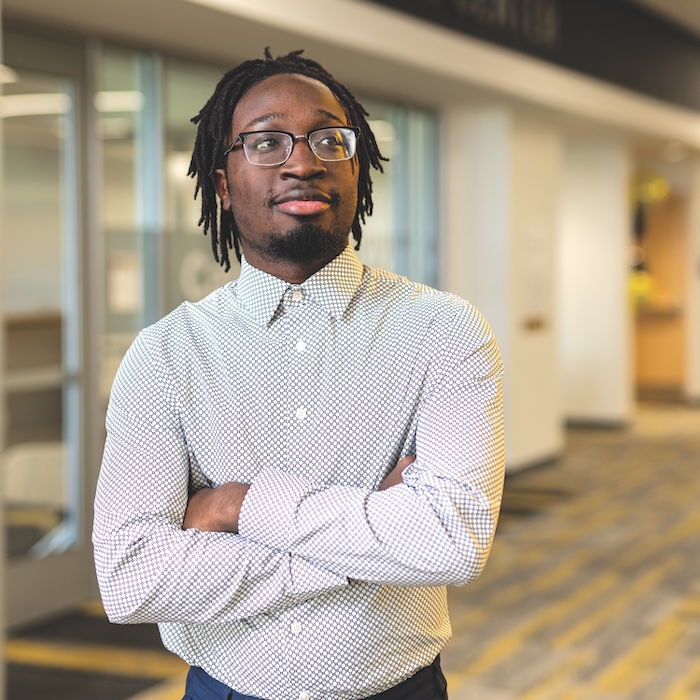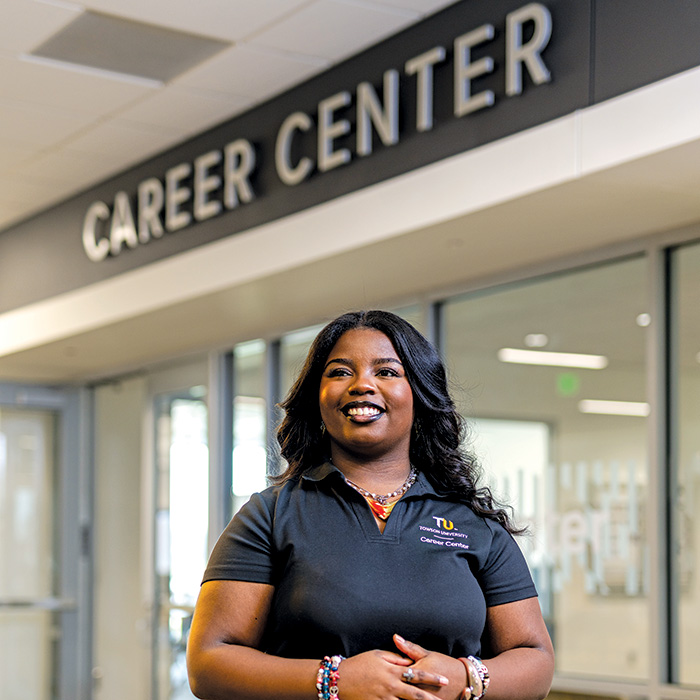Centering Student Success
TU’s career communities offer students personalized professional development.
Imagine there was a centralized location staffed by motivated people who use personalized resources and strategies to help students succeed.
This place does exist.
It’s called a career center, and students can use it to seek help for internship searches, mock interviews and networking preparation—all activities that are proven to aid in job searches.
Among the many supports Towson University’s Career Center offers are four career communities that feature focused coaching and programming by industry experts to maximize employment, experiential learning opportunities and career education for students and young alums.
“Career communities give students the specialized advising they need to ultimately be successful because what we want here at Towson is to make sure our students are able to find employment after they finish school,” says Wil Preston, director of career communities. “That’s the most important goal.”
When I received an internship offer from Tesla in Austin, Texas, as a junior, (program specialist) Zach Runge was instrumental in helping me make a class schedule that allowed me to graduate on time ... Marcy Lightfoot has been super helpful and supportive, particularly giving advice on negotiating pay, looking over my resume and working on interview tactics.
Shane Zaluski '24, Communications Studies Major
Each community has a dedicated career coach to work one-on-one with students for career planning and exploration and an assistant director of external relations who connects with outside employers and alums to locate and develop career opportunities that fit each student.
“We are a melting pot of transfer students, adult students, non-traditional learners, military/veteran students, international students and traditional students in their late teens,” Preston says. “It’s important that we have career communities that allow for everybody to get what they need where they are.”
By the Numbers
6,904
interactions with students
4,960
students attended job fair and events
93%
employed or enrolled in education six months after graduation
15,495
Unique students supported.
108,522
Jobs and internships posted to Handshake
$55,706
Average full-time annual salary for the Class of 2022
Renee Harris, assistant director career exploration and development, assists students who are undecided in their major or may be looking to change direction. She develops programming based on her conversations with students about what they need help with.
“I see a lot of anxious students about their majors, their careers,” Harris says. “I tell them, ‘This is a process of getting to know who you are, what things you value, what things you’re good at, what are some areas you may not be as strong in but you’re willing to put in the time, effort and energy to be successful.’”
Among the many apps and platforms available to students at any time through the Career Center’s website are What Can I Do With This Major? and O*NET Online. Amen Justice-Awuzie, assistant director—liberal arts career education and a TU alum, says those benefit liberal arts majors who have employability fears. “Those resources show you a lot of roles you probably haven’t considered,” Justice-Awuzie says. “With O*NET Online, for example, you type in psychologist, and it is going to pull up so many different jobs you can have in psychology but also related careers. And then you can start clicking and exploring.”

Subi Lawal '24
"The most valuable thing I learned was how important networking is for getting a job, and that showed when I got my job offer from the corporate headquarters of Walmart. I'm going to be a software engineer, developing next-generation products."
Students most frequently seek help with resumes and cover letters, finding an internship or job and preparing for interviews. Each career coach and employer relations staff member approach those requests in ways that are tailored to their communities.
Before students meet with potential employers, they typically need to work on their resumes and interview skills. Resumes can look different for each field, with nursing students needing a standard two-page document, for example. They can also be hard to build if a student doesn’t have much work experience, like student-athletes who have rigid practice and game schedules in addition to their academic coursework.
Interview coaching needs can vary from specific, hypothetical scenarios frequently encountered in health care job interviews to perfecting students’ elevator hiring pitches to employers, which apply in all fields.
“For students in STEM, it can be understanding what their skills are, including their soft skills,” says Tanja Swain, assistant director STEM career education. “It’s not just the technical skills. You are going to be working on a team. You have to communicate. You have to problem-solve. Here we have so many opportunities for students to do project-based work. I think our students have the skills to do really well in project- and team-based work environments.”
Marcy Lightfoot, my career coach, was instrumental in preparing me to land my job at 2fold Collective. Through multiple sessions, Marcy and I worked on strengthening my resume and preparing for all possible interview questions. Also, she guided me through researching various companies and my industry to understand what skills I needed.
Matthew Yankowski '22, communication studies
External outreach coordinators partner with career coaches to connect students to employers. In fact, they model the networking skills students need to learn through those partnerships.
“Sheila [Tilghman, external outreach coordinator for the STEM and health and wellness communities] and I work together to bring employers on campus,” says Swain. “We love doing STEM networking events where students can learn it’s not that hard. It feels scary and difficult, but I really encourage people to network.”
Twice a year the Career Center hosts the Mega Job and Internship Fair with more than 200 employers participating. The career communities’ staff can also address specific needs by hosting major-specific boutique job fairs or pointing students to Forage, an online program that provides virtual work experience at real companies, especially if the students are unable to travel to a job or internship site. And some—particularly health care majors—have less need for on-campus recruiting since they spend most of their senior years in full-time clinical internships.
However, the communities are not siloed. The communities’ staff work together in an interdisciplinary way to serve students who may fit in more than one community.

Miracle Harris '24
“I’m a career peer adviser in the Career Center, helping with resumes and cover letters. I feel very fulfilled knowing I'm helping students expand their career options ... I’ve met with my career coach, gone to networking events and signed up for the job shadowing program.”
“We can see connections between programs and then provide events and services that meet that interdisciplinary need that might be harder to do at a department level,” says Sidney Pink, assistant director external relations (liberal arts and fine arts and communication).
“There might be students in the liberal arts college interested in working at a museum just the same as an art history student. So we work across our group communities in strategic ways to maximize those opportunities for all students while still serving the individual needs in each career community.”
Justice-Awuzie concurs.
“It’s okay to be curious about everything you see,” she says. “If there’s an employer coming in, don’t just think, ‘That employer is not related to my field or industry, so I’m not going to go talk to them.’ You can see what they have because even if we have a hospital coming, for example, they need blog writers. They need website creators. Some of them need tech help. They have an HR department. They have administrative assistance.”
TU’s career communities’ staff members are united in how invested they are in student success.
“We are very student centered,” Preston says. “We’re really focusing on getting students the knowledge, career readiness skills, connection and experience they need to thrive in the world of work.”
How to Get Involved
Tigers Helping Tigers
The Tiger Mentor Network connects alumni with current students who need advice or are looking to network. Alums can choose their level of commitment and areas of engagement.
How You Can Help
There are many ways to get involved with your alma mater. Interested alums can contact the Career Center directly to recruit at career fairs or participate in mock interviews with students.
Alumni Career Services
Recent alumni (up to two years post-graduation) may take advantage of Express Hours and meet with a staff member for up to three in-person career counseling or advising appointments.